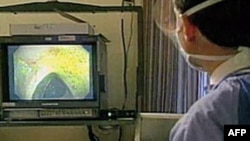Doctors may have found a new tool to help detect and predict colon and rectal cancer.
University of Michigan researchers say they have found a link between the bacteria in the gut and the cancers of the lower intestine.
Researchers analyzed the fecal matter of 3 different groups of people, one healthy, one had precancerous polyps and one group had advanced colon or rectal cancer.
What they found was that each group had different kinds of bacteria in their gut.
The findings are published in the journal Cancer Prevention Research.
If confirmed in larger groups of people, researchers say gut bacterial analysis could be added to other tests to determine an individual’s risk for colon cancer or as a way to confirm the presence of the disease.
Taking factors like race and age into account, the study showed by adding gut analysis to other routing testing improved the chances of predicting precancers polyps by 4.5 times.
The study showed the chances of predicting colorectal cancer jumped five times when adding the gut analysis to other tests along with risk factors like age, race and body mass.
According to the American Cancer Society, people of African descent are at a slightly higher risk than Caucasians for colon cancer as are those over age 50.




